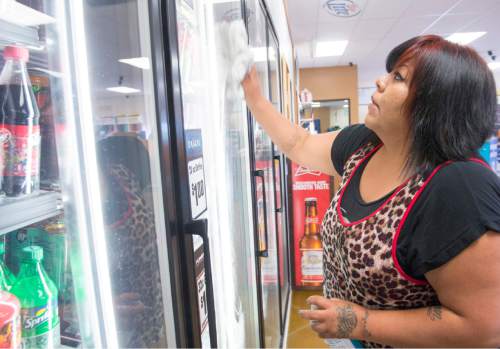This is an archived article that was published on sltrib.com in 2015, and information in the article may be outdated. It is provided only for personal research purposes and may not be reprinted.
Through the window of the See'Veets Eng convenience store, Red Mountain glows over a field of sage. Its orange cliffs rise out of the flat basin around Ivins Reservoir, casting a late afternoon shadow that warns cashier Misty Snow where not to go.
"There's things up there that shouldn't be disturbed," Snow says. "I don't know if there are burial sites. It's just something that my grandma and my great-uncle would always tell us: not to get too close to that mountain."
As a young girl, Snow suspected her elders' warning was a trick to prevent curious children from straying too far from the two small streets of federally constructed houses on the Shivwits Band's reservation near Santa Clara. She rode her horse toward the foot of Red Mountain.
From her house, she says, the contours in the cliffs look like a big skull looming over an outstretched hand. "It's so quiet there, it's creepy," Snow recalls. "My horse would only go so far before she got jumpy."
Snow turned back. When the spirits offer warning, it's best to listen.
Now 38, Snow has once again turned toward home. Until two years ago, she was working in St. George, usually at jobs she expected to lose quickly.
"I got married young, then got divorced. I never held down a job. I'd just quit," she says. "No call, no show."
And Snow drank. She says her only real brushes with sobriety had been when she went to jail.
"One day I just woke up with the worst hangover in my life," she recalled. "I just stopped partying. I was not court-ordered, not behind bars. A light bulb went off."
At that time, the Shivwits Band was sealing the deal on a new convenience store that had been a longtime dream of the community.
Unlike other Paiute bands, the Shivwits did not lose its reservation when Congress terminated tribal recognition; instead, members leased it to ranchers. But the band remained without water rights for more than a century, until the federal government settled a lawsuit in 2000 giving the band some of the water, funds for a pipeline and $5 million for economic development, which the band used to launch the store in 2014.
"The old ones always had a vision of something like this," Snow recalls. "When it was finally here, it was a big thing."
With high hopes but low expectations, Snow put in an application for a clerk's job. "I was mainly a party girl. I never thought they would hire me," she says. "When they did, I started on the right path. It's because we fought hard for the store. I feel privileged to be hired and work here. I want to do good for my people."
As Snow wipes down the windows of a drink cooler, members of the band pop in for cold drinks and gossip. Travelers on Old Highway 91 stop for gas.
A glass case holds beadwork by Paiute elders. Non-Paiute customers peer at the signs, written in both English and Paiute. Cold drinks are labeled "Spoo ee veep." Beer is "Sah'doonts." Over a rack of doughnuts, a sign reads "Peuv tuh kup (Sugar Food)."
After about a year at the store, Snow says she is a "different person." She now chats up customers, finds surfaces to clean when there are lulls in traffic, and tells about her daydream to one day travel from reservation to reservation, documenting each tribe's ghost stories on video.
That's a dream that takes shape as Snow looks out the window of See'Veets Eng to the field of sage where she went horseback riding as a child — close to Red Mountain, but not too close.











